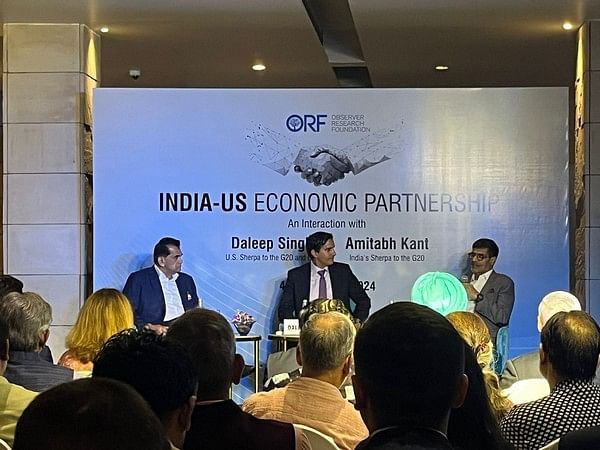New Delhi [India], September 5 (ANI): The United States has identified resolving the debt crisis in low-income countries as its “top priority” for the upcoming G20 meeting as more than 50 per cent nations are struggling with debt distress, said US’ G20 Sherpa and Deputy National Security Advisor (NSA) Daleep Singh here on Wednesday.

The next G20 summit will be held in Rio de Janeiro, Brazil, in November 2024.
Speaking at an event, titled ‘India-US Economic Partnership,’ hosted by the Observer Research Foundation (ORF), Singh also emphasised the need for the United States to develop its economic arsenal to change Beijing’s behaviour and support debt-stricken countries.
“I think from a US perspective, our number one priority for our G20 is to break the debt impasse in the developing world. More than 50 per cent of low-income countries are in or near debt distress. There are more than three dozen countries that are spending more on debt service than healthcare spending, education spending, and infrastructure spending combined,” said Singh.
“So, until and unless we break the debt impasse in the developing world, and much of the claims on these countries are owned by richer countries, namely China. China has emerged as the dominant provider of development finance in recent decades, and so we have to come together on a solution,” added the US’ G20 and G7 Sherpa during the event.
Reflecting on the past G20 summit in India that took place last year in the month of September, he appreciated New Delhi’s success in achieving consensus despite differing values and interests.
“Multilateralism and diplomacy are on the ballot. The G20 summit happens two weeks after the US election. So, It’s almost a binary outcome that we can look forward to. Last year’s G20 in Delhi was, I think, the recent high point. It was a masterful demonstration of how to bring together countries that don’t necessarily share all the same values and make the same interests towards a consensus statement. I think it’s going to be harder now,” said Singh.
Emphasising the need for American capital and technology to forge alliances with countries sharing interests, Singh suggested that sanctions are not the way forward.
The Deputy National Security Advisor (NSA) of the US also discussed the economic implications of sanctions, highlighting the unintended consequences and the need to understand who bears the burden and who benefits.
“If we want to forge an enduring set of alliances with countries that have shared interests, the way is not through sanctions. It’s going to be through economics and technology,” said Singh.
“I’m keenly aware that two thirds of the world, the world’s population, lives in countries that have not joined our sanction machine, and so we need to reflect upon that and decide how we can do better,” he added.
Speaking at the event, Amitabh Kant, India’s G20 Sherpa, praised New Delhi’s G20 agenda, particularly in Sustainable Development Goals (SDGs), green development, and technological transformation, but also highlighted ongoing conflicts and the climate crisis.
“My view is, first of all, that the only functional multilateral body in the world right now is the G20. I think in many ways, India set up a very ambitious agenda, and was able to push a lot, on SDGs, which is very critical of the post-COVID era. We pushed a lot of green development and technological transformation. But if you look at the challenges confronting the world, I would say the biggest challenge is the conflict in the world now, is Russia-Ukraine war. Plus this Middle East conflict, you’ve lost about 50,000 people in Russia-Ukraine war and over a million plus, and a huge humanitarian crisis in the Middle East. That’s the crisis in the world,” Kant said.
“The second crisis is climate action. 2023 was the hottest year and 2024 is going to be even hotter than 2023. And thirdly, the avoidance of new technologies, AI quantum computing, etc, which have the potential to transform the lives of citizens across the world to enhance productivity, but also have the challenge of being regulated in a very pro-innovation manner, which is very important. And all these three critical issues are, to a great extent, a function of how the US elections will shape up on all these three issues,” he added.
Further, while discussing the need for Indian manufacturers to learn the art of penetrating the American market, Kant drew parallels to the historical success of countries like Japan, Singapore, and Taiwan in growing their economies through exports.
Kant also emphasised the importance of India’s share in global exports, its need to work on global value chains, and the potential of India to achieve high growth rates through exports.
“If we were aiming to be a level of country by 2047, that means your ambition is to take your GDP, maybe the fifth largest economy, going to be a third largest economy, but your aim is to take it to USD 30 trillion economy by 2047 and your aim is to take the per capita income to close to 18,000 which means that you want to grow your GDP by about 9x and your per capita income by about 8x in the coming two decades. Now this would mean, my strong belief is that if India wants to do it, it needs to work very closely with America, and it needs to intertwine itself with global value chains,” said Kant during the event in New Delhi.
“If you look at the history since 1945, countries which have grown and prospered and become rich like Japan post World War Two, between 60-90 Korea, Singapore, Taiwan, all of them became wealthy countries and were able to grow at 9.6 per cent because they were exporting nations, and they could export and penetrate the US market. So, the Indian manufacturers must learn the art of penetrating the American market,” he added. (ANI)
This report is auto-generated from ANI news service. ThePrint holds no responsibility for its content.



